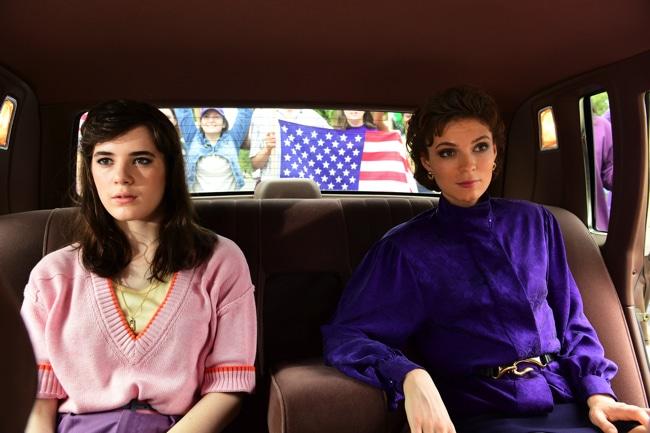Dir: Unjoo Moon | Cast: Tilda Cobham-Hervey, Evan Peters, Danielle Macdonald | Biopic Drama 116′
There are two iconic feminist anthems that stand out in the memory: one is Gloria Gaynor’s I Will Survive, the other is I Am Woman.
Written and sung by the not quite so famous Seventies singer Helen Reddy, her theme tune nonetheless comes from a place of calm confidence. Is not strident, desperate or defiant but sure of its positive message. Yes, I am a woman but I’m also warm, approachable and secure.
Of course Reddy – played here by a fabulously feline Tilda Cobham-Hervey – was an accomplished artist who made a number of hit records during the late 1960s and 1970s. And Unjoo Moon’s fond but enjoyable rags to riches debut biopic shows how she made it from nowhere to become one of the most popular singers of her generation.
Her story starts in 1966. The mother of a 3 year girl Tracey, she arrives in New York from Sydney hoping for a recording contract from a major music producer who immediately patronises her in a film fraught with the ingrained prejudice of the era: “you really flew over from Australia all by yourself?” He denies her a contract claiming the trend is for male bands “the Beatles are all the rage”. Trying to make her way, she is later denied equal pay as a nightclub singer on the grounds of her status as an illegal alien. But she is not deterred. And with Emma Jensens’ script painting her as a purring lowkey diva, Cobham-Hervey’s Reddy has to figure out how she can keep her canny charisma and move on from being just another talented female vocalist to an assertive, no-bullshit ballbreaker – just like a man – to get to the top. But the Seventies is the era of the singer-songwriter (with a selection of gracefully performed numbers featuring here, dubbed by Chelsea Cullen) so Helen has come to America at just the right time.
Based on Reddy’s own memoirs The Woman I Am, Moon and Jensen do their best to tether the feature to the current upswell of gender parity issues. But it’s not only fame and success as a female Reddy has to conquer but also several tricky relationships, not least her budding romance with potential agent Jeff Wald (Evan Peters), who becomes Helen’s second husband, putting his own life first along with the other high level clients in his portfolio, mostly notable being the rock band Deep Purple. The two form a feisty partnership Jeff spurred on by his wife’s calm determination to pioneer her gently feministic easy listening style. The couple are now living in California where Reddy has bought a poolside mansion with cash.
Meanwhile, the ego-driven Jeff is proving a handful and needs to be managed with an iron fist. Reddy’s other key relationship is with her compatriot Lillian Roxon (Danielle Macdonald), who is making her way in music journalism and is known for the first rock encyclopedia in 1969. But both these relationships will falter: Jeff turns into a belligerent, megalomaniac coke head running through all the couple’s money, and Lillian dies of an asthma attack.
The film’s focus is very much Reddy’s invidious relationship with Jeff but fails to examine why the singer stuck to easy listening style in a career that was successful (Angie Baby, I don’t know How to Love Him and Ain’t No Way to Treat a Lady) but never really had a narrative arc of its own or a progression beyond her female-centric ballads. We do see her attempting to break into the Jazz style she had always been keen on, but this desire is stymied by Jeff and her advisors who control her activities to secure their own profits. And the sheer will and perseverance of making it anyway must have taken up most of her emotional energy, with two children to rear and a mercurial misogynist husband and manager to deal with.
Dubbed “the queen of housewife rock” by Alice Cooper, Reddy is clearly a symbol of female empowerment but more in the style of Phyllis Schlafly than her fellow chanteuses of the era Joni Mitchell, Carly Simon or Carol King. Cleverly the film never comes across as women’s lib story – and in a one certainly doesn’t get the impression Reddy was a ‘bra-burner’, more as a tribute to a woman whose talents as a singer is showcased in Cobham-Hervey’s sinuously stylish performances that make her really appealing to watch and listen in the film. Yet looking back on her music as a teen of that era Reddy was never on the radar as being remotely ‘cool’ or ground-breaking in the style Mitchell and Simon.
Superbly lensed by Oscar winning DoP Dion Beebe, the film’s final scenes therefore come across as an afterthought and tonally out of kilter with what has gone before. That said, this minor flaw does nothing to detract our enjoyment of Cobham-Hervey’s performance that carries the film through with an astonishing tour de force of grace, poise and fervent femininity. MT
IN CINEMAS FROM FRIDAY 9 OCTOBER 2020
